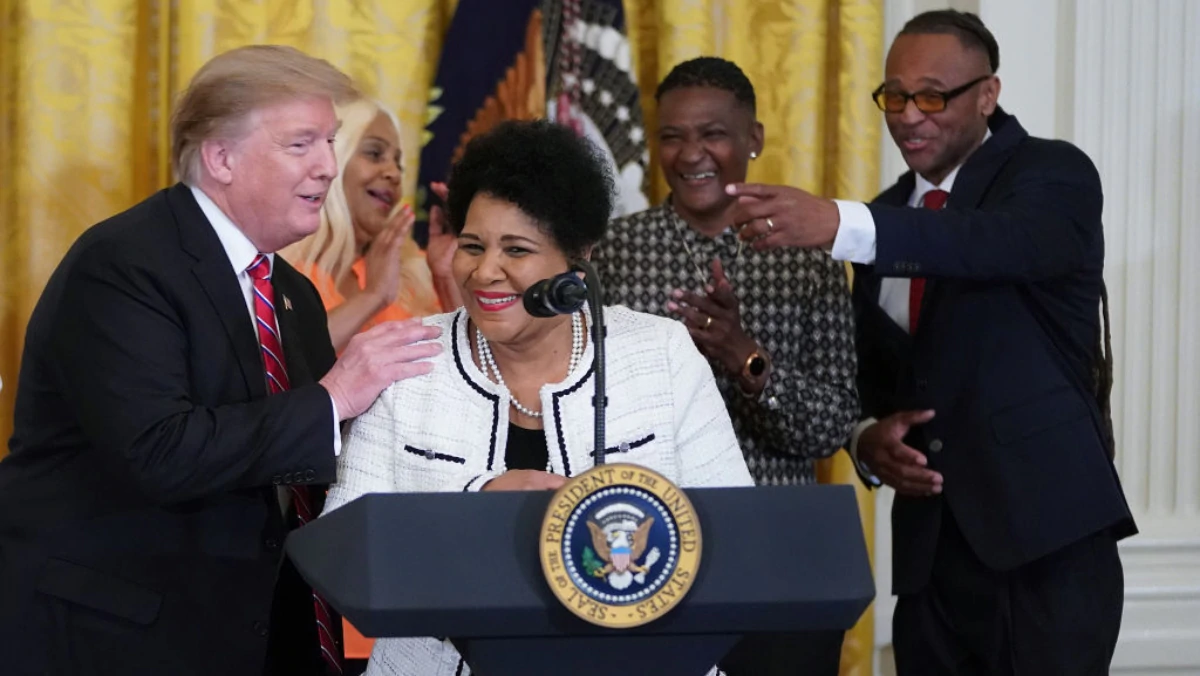[ad_1]
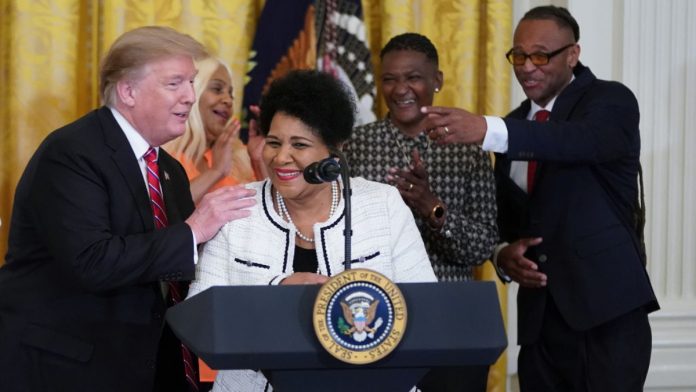
The Trump administration works overtime to keep Black people from attaining political and economic freedom. Yet the president’s reelection campaign called a clever play on Super Bowl Sunday with an ad that sells Trump as a compassionate, conservative fighter for justice.
In the campaign’s second ad spot for the Super Bowl, Trump’s campaign features the story of Alice Marie Johnson, a 64-year-old grandmother granted clemency after getting a life sentence and serving more than 20 years in prison for a nonviolent drug offense. The ad uses emotional footage from the moment of her release, where Johnson is surrounded by family while tearfully thanking Trump.
But this ad isn’t really about uplifting Johnson. Instead, Trump’s Super Bowl ad exploits her case to mislead voters and claim credit for criminal justice reform work that he didn’t do. It’s an act of political trickery that’s more insidious and harmful than it may seem on the surface.
READ MORE:
The ad’s timing and placement are far from coincidental. The NFL and the San Francisco 49ers, who played in Sunday’s game, have spent more than three years mired in controversy after tanking Colin Kaepernick‘s career. Kaepernick taking a knee during the national anthem, an otherwise silent act of protest against police brutality, and the ensuing backlash, relegated him to being blacklisted by team owners.
Trump repeatedly derided Kaepernick as a means to rally supporters in 2016. After taking office, he eventually gave himself credit for keeping the former 49er unemployed. All the while, he has continued touting “law and order” messages that protect law enforcement from valid critiques. Trump also openly encourages and praises police violence, with appeals to his “guys” being as tough as MS-13 gang members.
Trump leveraged the popularity of Super Bowl commercial breaks to place himself on a pedestal for doing the bare minimum to support Black lives. Johnson’s story arguably wouldn’t have landed on his radar, had it not been for months of lobbying efforts led by celebrities like Kim Kardashian West. She’s not mentioned once in the ad, nor are the actions of other influencers and lawmakers.
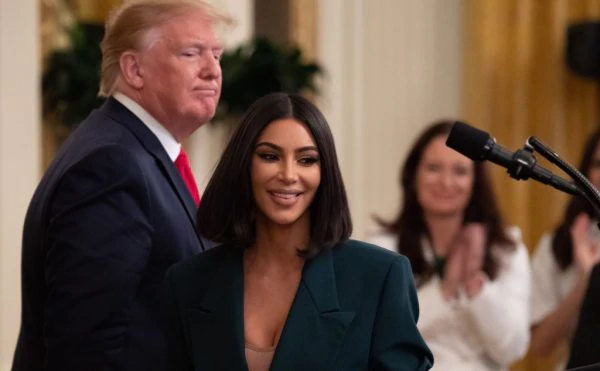
READ MORE: 5 Things I want Kim Kardashian to make happen now that she got Trump to spring Alice Johnson out of prison
Kardashian amassed a legal team to help make a case for Johnson’s clemency, and used her celebrity to persuade Trump, culminating in the June 2018 prison release. During that same period, members of Congress introduced the First Step Act, a bill that underwent several bipartisan revisions, before Trump ever came around to supporting any reforms. His change of heart, in large part, can be directly attributed to Kardashian West’s work.
“Politicians talk about criminal justice reform” appears on screen at the ad’s halfway mark. And directly after, the phrase “President Trump got it done” shows up more than twice as large as any other displayed text during the 30 seconds of air. Typical Trump. All about himself.
Sure, he granted Johnson clemency. Yet Trump rarely and barely ever uses his executive power to support Black people who seek opportunities for a better life, regardless of whether or not they’ve been incarcerated.
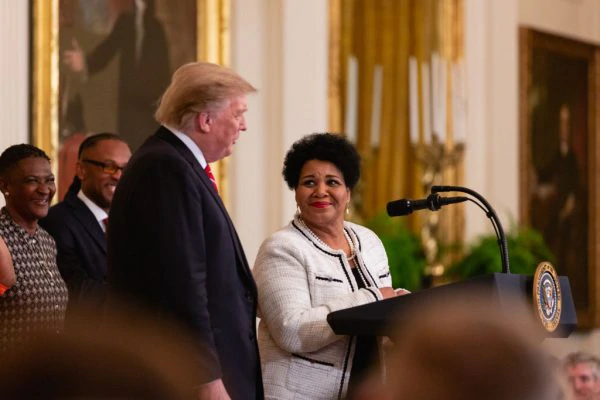
[Donald Trump] doesn’t care about Black people
Days before the big game, the Trump administration kicked off Black History Month by expanding its immigration ban to include Eritrea and Nigeria, the most populous nation in Africa. In addition, people from Sudan and Tanzania will become ineligible for the diversity visa program. Trump’s immigration restrictions date back to the first weeks of his presidency, targeting predominantly Muslim, African and Latin American countries — “sh*thole countries” as he calls them — despite court challenges and swift rebukes from several civil rights groups.
The timing of the Super Bowl ad featuring Johnson, arguably functioned to deflate backlash from the NFL’s controversies on race issues, and divert attention away from charges of racism tied to new immigration restrictions for four African countries.
The spot also landed, along with the game itself, on the eve of the first 2020 presidential primary contest in Iowa, and afforded the campaign an opportunity to drive home a narrative that Trump and his voting base can weaponize against valid critiques of his racism.
It’s the advertising equivalent of the “I’m not racist, I have Black friends” or “I tried to help Black people” excuses that some white people use to defend themselves when challenged about racial prejudice.
A number of the Democratic candidates’ platforms include criminal justice reforms that go many steps further than the president likely ever would, despite what his Super Bowl ad suggests.
READ MORE: Actress Helen Mirren says thanks to Kim K, J Lo – big butts are acceptable
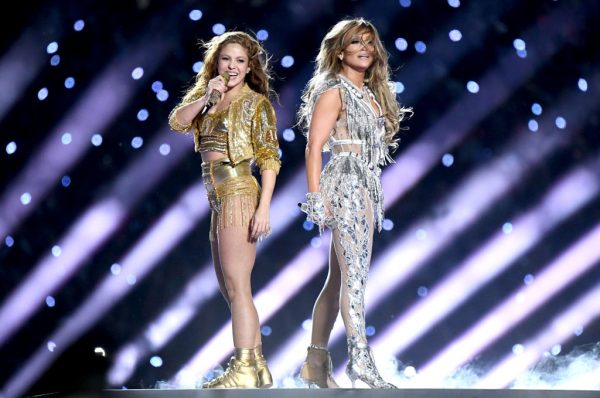
Even with the absence of visible, Black resistance at the Super Bowl this year, the two halftime show headliners managed to use their platform to challenge Trump on justice issues that affect Black and Brown people from Latin American countries. They reminded us of the law enforcement abuses and misuses of presidential power that Trump’s campaign ad glosses over.
Sunday’s halftime performance featuring Shakira and Jennifer Lopez included a symbolic display of children in cages, a nod to the tens of thousands of migrants jailed or confined in camps, subjected to life-threatening conditions, along with parents separated from their children at the border with Mexico. It’s a direct result of the Trump administration’s “zero tolerance” immigration policy.
Lopez also donned a two-sided, feathered cape with the Puerto Rican flag and U.S. flag, which could be interpreted as both a celebration of her heritage and a reminder of how the Trump administration has spent more than two years hampering aid to an American territory ravaged by multiple natural disasters.
READ MORE: A 6.4 earthquake rocks Puerto Rico amid heavy seismic activity
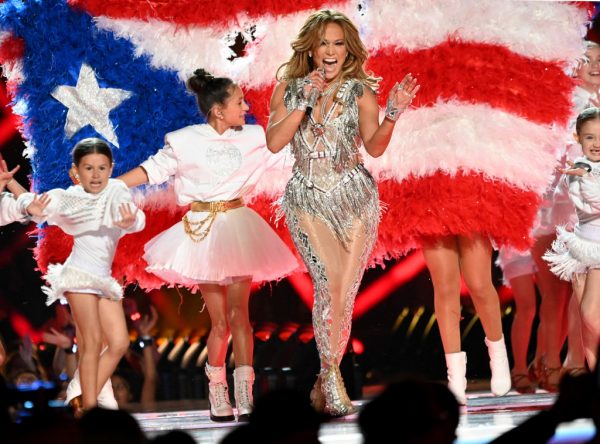
READ MORE: WATCH | Father-daughter lawyer duo fights for the rights of Black residents in Puerto Rico
Trump’s Super Bowl ad touts how “thousands of families are being reunited” because he eventually signed off on the First Step Act. All the while, his administration’s immigration policies at the southern border continue to rip families apart. The lagging efforts to help rebuild infrastructure in Puerto Rico adds insult to injury as displaced families and thousands of others still struggle to access basic necessities as earthquakes continue to strike.
During his 2016 campaign, Trump tried to drum up support from African-American voters by asking one simple question: “What do you have to lose?”
Four years later and reality still bites. “Make America Great Again” has since morphed into “Keep America Great.” Black people — and millions more who struggle amid Trump’s attacks on people of color and the impoverished — have a lot at stake.
Exploiting one Black woman’s pain with a high-priced, primetime ad shows just how far Trump’s campaign will stretch the truth to convince Americans that the president and his policies aren’t racist.
Yes, we’re happy Ms. Johnson’s painful imprisonment is over.
But the whole truth about Trump and his policies still hurts.
Derrick Clifton is a Chicago-based writer on the intersections of identity, culture and social justice issues. Follow them on Twitter: @DerrickClifton.
[ad_2]
Source link

